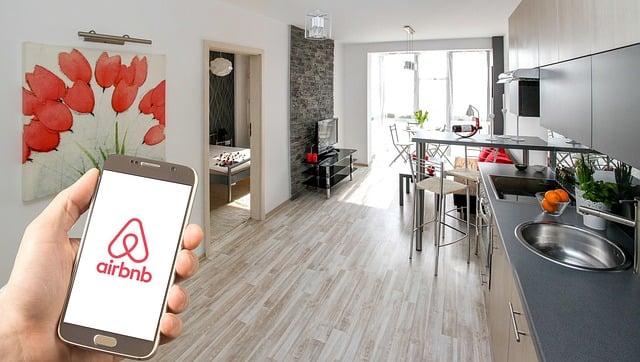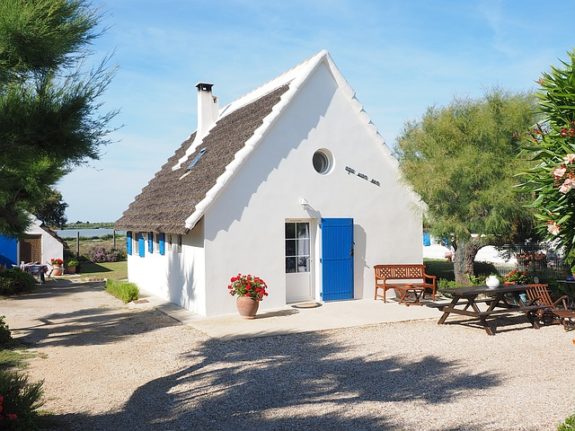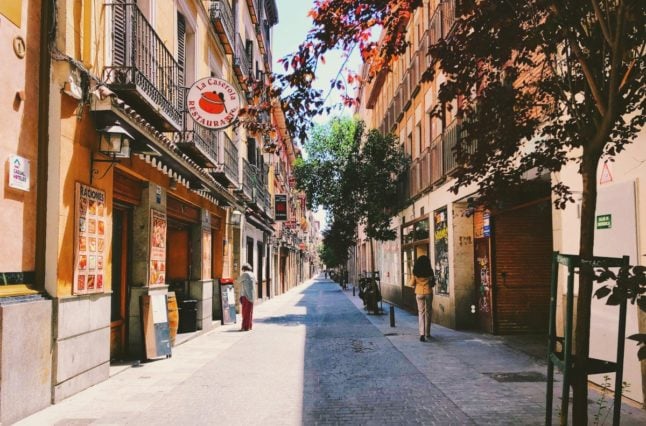In July 2022 there were 21.8 million overnight stays in tourist apartments in Spain, according to Spain’s National Statistics Institute (INE), many of these were through Airbnb.
READ ALSO: A third of Spain’s Airbnb landlords own five or more properties
Spain has had a turbulent relationship with tourist rental sites such as Airbnb with many city councils battling against rising numbers of illegal apartments and the impact it has on rental prices for residents.
In July 2022, Barcelona City Council demanded that Airbnb remove 4,100 unlicenced tourist rentals from its platform and threatened the company with a €60,000 fine.
Back in 2016, the Catalan Tourism Register fined Airbnb €30,000 for not responding to demands from the administration, requesting details on homes advertised without registration numbers. Then in 2018, Spain’s Balearic Islands also attempted to fine Airbnb €300,000 for advertising unregistered tourist flats, but the Balearics’ Supreme Court annulled the fine in 2020.
So, with all these tough crackdowns and rules, how can you make sure you rent out your apartment legally on platforms such as Airbnb?
How do I legally rent out my property in Spain on Airbnb?
Generally, most regions in Spain require you to apply for a tourist licence before being allowed to rent your accommodation out to tourists. The process is slightly different for each region but is generally done online through each regional government site.
For more information about your area, you should visit your local Town Hall or Ayuntamiento.
In March 2019, a new law was passed in Spain which states that if three-fifths of the owners of a building are against short-term rentals in their premises, they can decide to limit or prohibit tourist apartments in their building.
This means that as well as registering your accommodation with the relevant authorities, you must also get permission from the other owners in your building.
In the last few years, several Spanish regions have also brought in new laws and limitations for tourist accommodation, so make sure you do your homework before considering renting out your accommodation on Airbnb.
This is because not only do most regions in Spain have differing rules, but many municipalities do too. For example, the rules for renting out accommodation in the cities of Barcelona or Valencia are different from the rules for the rest of the region.
Andalusia
The Andalusian government define tourist accommodation as a residential property that is repeatedly rented out to tourists and charged for. It can be rented through tourism channels such as travel agencies or companies that allow bookings to be made such as Airbnb.
In order to legally operate an Airbnb apartment in Andalusia, you will need to register the property with the Tourism Register of Andalucía, and agree to comply with the regulations of the Tourism and Sports Council.
Find out how to apply for registration here.
If your application is successful, you will receive a registration number, which you must add to your Airbnb listing. For more information on renting out tourist accommodation in Andalusia, you can look on the Andalusian government website.
Catalonia
The Catalan government consider tourist accommodation to be any accommodation rented out to paying guests for short-term stays. In order for your apartment to be legal, you must register it with the municipal authorities and apply for a tourist licence. You can apply for your licence or Habitatge d’Ús Turístic (H.U.T) number here.
On August 6th 2021, the city of Barcelona completely banned short-term private room rentals, the only major European city to do so. You are still allowed to rent out an entire apartment, as long as you have the appropriate tourist licence.
Be aware in Barcelona, it is not possible to get a new licence anymore. In 2017, Barcelona mayor Ada Colau banned new applications so the only way to legally rent out an Airbnb apartment in Barcelona is to buy one of the circa 9,600 apartments that already have tourist licences.

Valencia
You need to register any tourist accommodation in Valencia with Valencia’s Tourism Register by submitting a formal notice to the Territorial Tourism Service of the province where your apartment is located and state your intention to use the property for tourist accommodation. You can find out more about Valencia’s tourism accommodation laws here.
Once you have been granted your licence you must display your registration number on your Airbnb listing.
In June 2018 the Municipality of Valencia issued various limitations for tourist apartments in the city. These are:
- The tourist accommodation must be located on the ground floor or the first floor.
- The apartment must not be located above or on the same landing as another private residential dwelling.
- The building must not have more than 50 percent of tourist accommodation.
- In the Ciutat Vella, you can only rent your apartment out to tourists for a maximum of 60 days.
In January 2019 a municipal decree for Valencia city was introduced which requires you to renew your tourist licence every five years.
Madrid
In Madrid, you are required to register any tourist accommodation with the Register of Tourism Enterprises and will have to agree to comply with the existing regulations. You can find the link on how to do so here.
Once you receive your licence number, you must also add it to your Airbnb listing.
In March 2019, Madrid city limited the number of tourist rentals possible in different neighbourhoods, so if you plan on renting out an Airbnb apartment in the city, you’ll need to contact the Madrid City Council first to see what your options are.
Balearic Islands
If you want to rent out tourist accommodation in the Balearic Islands you must declare your intention to do so and obtain a registration number from the General Register of Companies, Activities and Tourist Establishments of the corresponding Council.
Mallorca
You can register your tourist apartment and apply for a licence in Mallorca here.
Ibiza
You’ll find the link for registering your tourist accommodation licence in Ibiza here.
Menorca
You can apply for your tourist licence in Menorca here.
Formentera
Apply for your registration for Formentera tourist apartments here.
Mallorca especially has cracked down hard on tourist rentals and since July 2018 introduced a complete ban on tourist apartments in the capital of Palma de Mallorca. This means that no more licences are being issued, even though Airbnb still shows many apartment listings there.
Asturias
If you want to rent out your flat on Airbnb in Asturias, you will need to register your accommodation with the Ministry of Employment, Industry, and Tourism here.
Like the other regions, once it’s complete, you will receive a registration which you must display on your Airbnb listing.
Navarra
The Tourism Registry of Navarra requires you to submit a responsibility statement to the Directorate General of tourism. You can register your tourist apartment and apply for a licence here.
There are slight differences in the process depending on whether you are registering a rural property or a tourist apartment.
Taxes
Taxes will of course be different for everyone, depending on their circumstances, but generally you will be liable to pay tax on any money you make from renting out your property on Airbnb.
Legally you must declare your earnings from renting out your tourist accommodation to the tax authorities, whether you are a resident in Spain or own a property as a non-resident
This IRNR (Non-resident Income Tax) is 19 percent on net income for EU residents and 24 percent for non-EU residents.
Crucially however, foreign non-resident homeowners from the EU, Norway and Iceland can claim back many more expenses (mortgage interest, insurance, IBI, community fees etc) which non-EU resident property owners cannot.
READ ALSO: ‘It’s absurd’ – How Britons who let out properties in Spain will see taxes triple after Brexit
Depending on your situation, you may be required to present these earnings on your yearly ‘declaración de la renta’ tax return. However, if you regularly rent out your accommodation to tourists and it is a business for you, then you may be required to register as autónomo or self-employed. This means sending in quarterly tax returns declaring your earnings, as well as paying social security. You may also have to charge IVA or VAT.
READ ALSO – Self-employed in Spain: What you should know about being ‘autónomo’
You should always speak to your gestor or accountant about your specific tax situation and what you are liable to pay.
In some regions, you will also be obliged to collect a nightly tourist tax from your guests and declare it to the relevant authorities in your area. This may require filling out extra tax forms too.
In 2018 Spain introduced a new tax form called the Modelo 179, specifically for intermediary companies such as Airbnb which require them to identify the properties and the owners renting out apartments on their site, the number of days the property has been rented out for, the income amounts and the means of payment.
This means that it will be very difficult for you not to declare your rental income to the tax authorities because they will already have a record of how much you earned.
What are the consequences of not getting a tourist licence?
In most cases, if you do not have a tourist licence and are found out to be renting out your property on Airbnb or similar, you will incur a hefty fine. Fines differ slightly depending on your region.
In the Balearic Islands, for example, property owners who rent out their apartments illegally can be fined anywhere from €20,000 to €40,000, while in Barcelona you can be fined up to €60,000.



 Please whitelist us to continue reading.
Please whitelist us to continue reading.
Hello – This article is not clear because it does not make the distinction between the rental of an entire apartment or if an on-site owner is simply renting out a room vis a vis airbnb et al. Please clarify. Thanks.